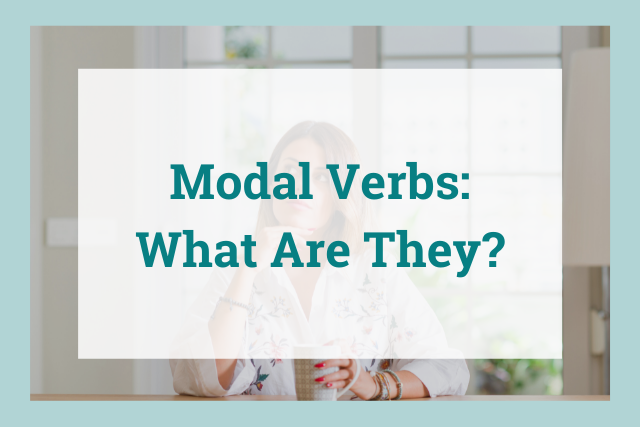
What Are Modal Verbs?
Modal verbs are special verbs that express necessity or possibility. They are helper verbs that give additional information about the main verb.
Modal verbs are also known as modals, modal auxiliaries, or modal auxiliary verbs. Even though those sound more complicated, don’t worry—they’re just the same as modal verbs.
Modal verbs can be tricky because they have many rules and uses.
Never fear! In this article we’ll cover the nine modal verbs and how to use them. We’ll explain their special rules and provide some examples for you to practice with.
We’ll also talk about semi-modals (or modal phrases), which function similarly but have different grammar rules.
If that sounds like a lot, don’t worry. Modal verbs are very common. It’s likely that you know them well already, even if you didn’t know they were called “modal verbs.” Before long, you’ll be a master of all things modal.
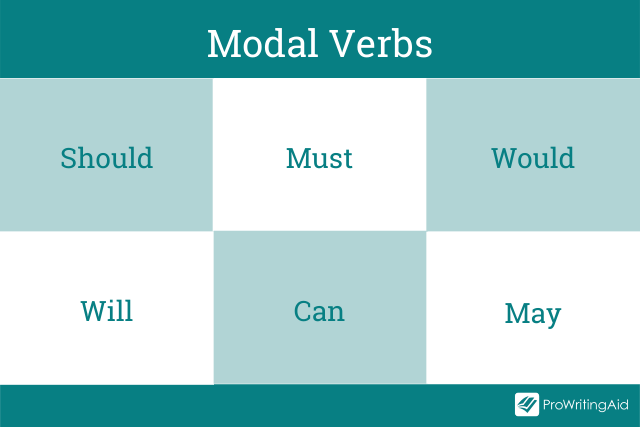
What Do Modal Verbs Do in a Sentence?
According to Merriam-Webster, the definition of a modal verb is:
“A verb (such as can, could, shall, should, ought to, will, or would) that is usually used with another verb to express ideas such as possibility, necessity, and permission.”
Modals are helper verbs, meaning that they help other verbs by expressing modality. That’s a fancy way of saying that modals express conditions.
They help the main verb to convey ideas like certainty, possibility, willingness, obligation, prohibition, necessity, advice, or ability.
What Are the 9 Modal Verbs?
There are nine modal verbs in English. These are:
- May
- Might
- Must
- Can
- Could
- Shall
- Should
- Will
- Would
To this list we can add the semi-modals or modal phrases like ought to, have to, need to, and be able to.
These behave similarly to modal verbs and you can think of them as part of the same list, but they have slightly different grammatical rules.
What Are the Rules of Modal Verbs?
Modal verbs are unlike other verbs and have different grammar rules. Let’s review the special characteristics of modal verbs.
Rule 1: Modal verbs agree with any subject
Verbs are doing words—they denote an action, like reading, walking, or dancing.
Usually, when different people complete an action, the way we spell the verb for that action changes:
- I/You/We/They dance
- He/she/It dances
See how we added the s for he, she, and it?
Unlike normal verbs, modals never change their form (spelling) depending on who is completing the action.
Any subject (person/thing completing an action) in any sentence takes the modal verb in the same way (“I can,” “she can,” “we can,” and so on), with no need to add “s” for he, she, or it (he/she/it can).
Rule 2: Modal verbs have no infinitive form
This just means you cannot say “to may” or “to could”; these forms simply don’t exist in English.
Rule 3: Modal verbs do not have participle forms
Again, this sounds more complicated than it is. You never add endings like “-ed,” “-ing,” or similar to a modal verb—“coulded” or “shoulding” just sound weird, right?
Modals keep it simple; they will always appear exactly as written in the above list.
Rule 4: Modal verbs are followed directly by the bare infinitive (an infinitive without “to”)
For example:
- I could hear the dog barking (NOT I “could to hear” the dog barking), or
- You should tell the truth (NOT You “should to tell” the truth)
Hear and tell are the infinitives in these sentences.
Rule 5: Modal verbs form questions by inversion
Modal verbs are auxiliary verbs and form questions by inversion. This means you do not need to add an additional modal verb when forming negatives or questions.
For example, to change the sentence “I must go” into a question, you can just move the modal must to the beginning of the sentence:
- Must I go? (NOT “Should I must go?”)
Similarly, to change “He should smoke” into a negative, we simply add “not”:
- He should not smoke (NOT “He must not should smoke”)
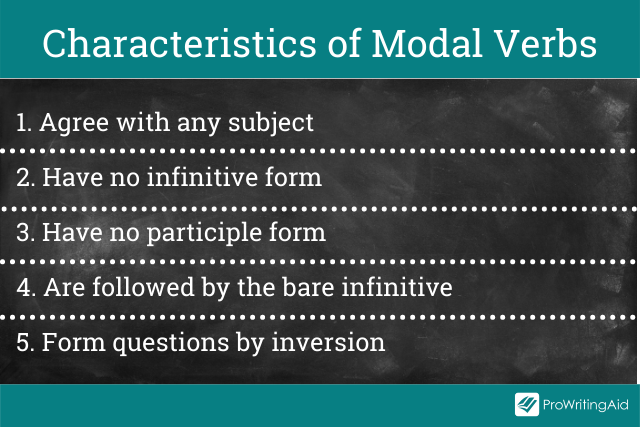
How Do I Use Modal Verbs in a Sentence?
Modal verbs allow speakers to express a wide range of conditions like certainty, possibility, willingness, obligation, necessity, ability, permission, prohibition, advice, or probability.
Let’s take a look at some examples and see each of the modal verbs in action.
When and How Do I Use Can, Could, and Be Able To in a Sentence?
Can, could, and be able to are used to express a variety of ideas.
These include:
- the ability to do something (or lack thereof)
- the possibility or impossibility of doing something
- asking or giving permission
- making a suggestion
Let’s look at a few examples of each.
Ability
Modal verbs explain whether or not someone can do something. For instance:
- Naila can recite poetry by heart.
In this sentence, the modal verb phrase can recite tells us that Naila has the ability to memorize and recite poems. (Go, Naila!)
The specific modal verb phrase you use will depend on which specific modal verb you’re using and what tense you’re writing in. For example:
- I can help you move today.
- I will be able to help you move today.
In the first sentence, the word can is accompanied by the verb help because the word can doesn’t require the assistance of to.
In the second sentence, the phrase be able to is necessary to help the sentence make sense.
Note: you can also use those phrases interchangeably. It’s often simpler and more effective to say can rather than to be able to.
Here are some more examples of modal verbs used in this way:
- I can help you with your homework tonight.
- We can’t come to dinner.
- The computer can solve complex problems easily.
- A representative will be able to speak with you in about ten minutes.
- Grandma won’t be able to join us this weekend.
- When they were young they could move mountains.
- The local branch was able to increase sales by 12%.
- I haven’t been able to reach them by phone yet.
Possibility
You can use can or could to say whether something is possible.
- You can call this number any time before 10pm.
In this sentence, the phrase can call means that it is possible to call the number so long as it is before 10pm. If the time is after 10pm, your call will not go through. Better check your watch!
The phrase you use will depend on which modal verb you’re using and what tense you’re writing in. For example:
- You could watch the game on the big screen.
Here, we use could to suggest that this is one possible option of several.
Here are some more examples of using can and could to say if something is possible in a sentence:
- I can’t believe what I’m hearing!
- Yes, you could take a trip to Sacramento this weekend as you have vacation time left.
- He couldn’t understand it if he tried.
Permission
You can also use modal verbs to ask for something, or to give or deny someone permission to do something.
- Can you help me with this?
This question is asking for a response that will also use a modal verb (Yes, I can or No, I can’t).
Could also works in the same way here:
- Could you help with this?
- Could I borrow a pencil please?
When we answer these questions, can and could are used to give permission, and can’t and couldn’t are used to deny it, like this:
- I can’t help with that, you have to do your homework on your own.
- Yes, you could borrow a pencil.
In the first sentence, the speaker doesn’t have permission to help the asker. They’re trying to cheat!
Suggestions
You can use the modal verb could to suggest things someone is able to do out of a range of options.
- You could take the express bus.
In this sentence, the phrase could take not only means that it is possible to take the express bus, but that it might be a useful or good thing for someone to do.
Review Exercise: Can, Could, Be Able To
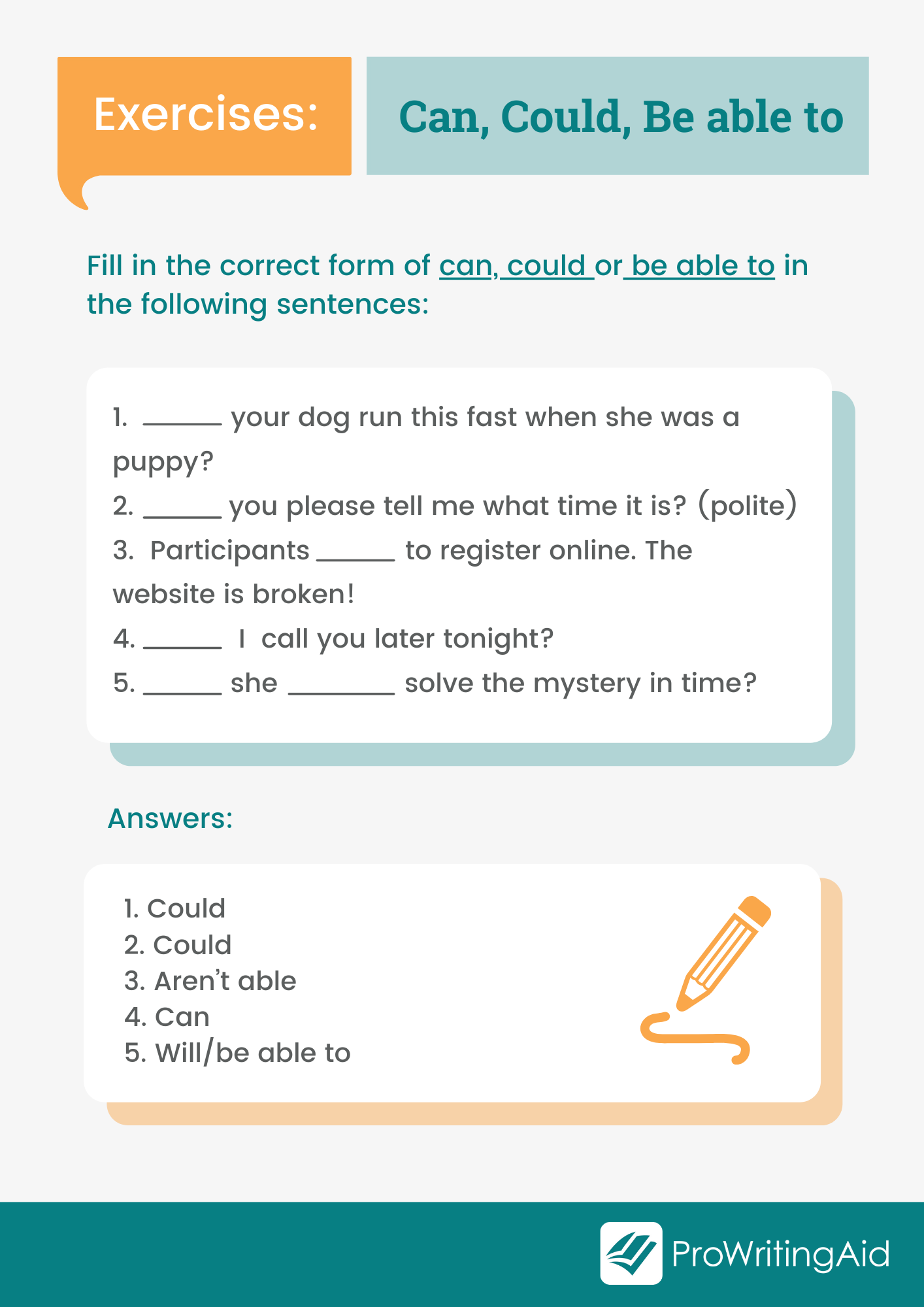
Download the review exercise for can, could, and be able to here.
When and How Do I Use May and Might in a Sentence?
May and might are used to express a variety of ideas, from prohibitions, expressions of possibility or impossibility, and making polite suggestions.
In many cases, you can use may in the same way as can. What’s the difference? May is often considered more polite.
Permission
If you’re speaking to someone in a formal context, you’ll often use may instead of can to ask for or give permission, like this:
- You may begin the exam now.
- May I address you as Doctor P?
- No, you may not!
You can also use may to make a polite request:
- May I take your order?
Note that you could also use can here (Can I take your order?). The only difference is that may is considered more polite.
Possibility
Like may, might can be used to indicate possibility. Both words work in the same way in the examples below:
- We may go to the movies after dinner.
- You might want to write this part down.
- Ali may not get a dog after all.
- It might not rain tonight.
In these examples, the events are possible but not certain.
Suggestions
May / might is also used to make a suggestion when there is no better alternative:
- You may as well try it. What have you got to lose?
- We might as well stay home. All the shops are closed now.
You can see that we usually use the phrases may as well and might as well here. This just means that you may as well try it as not—the result will probably be the same either way.
And finally, if you want to make a polite suggestion, you can use might. This is normally when you want to offer your opinion, but you don’t want to force someone to do something.
- You might like to try the daily special. It’s delicious!
Review Exercise: May / Might
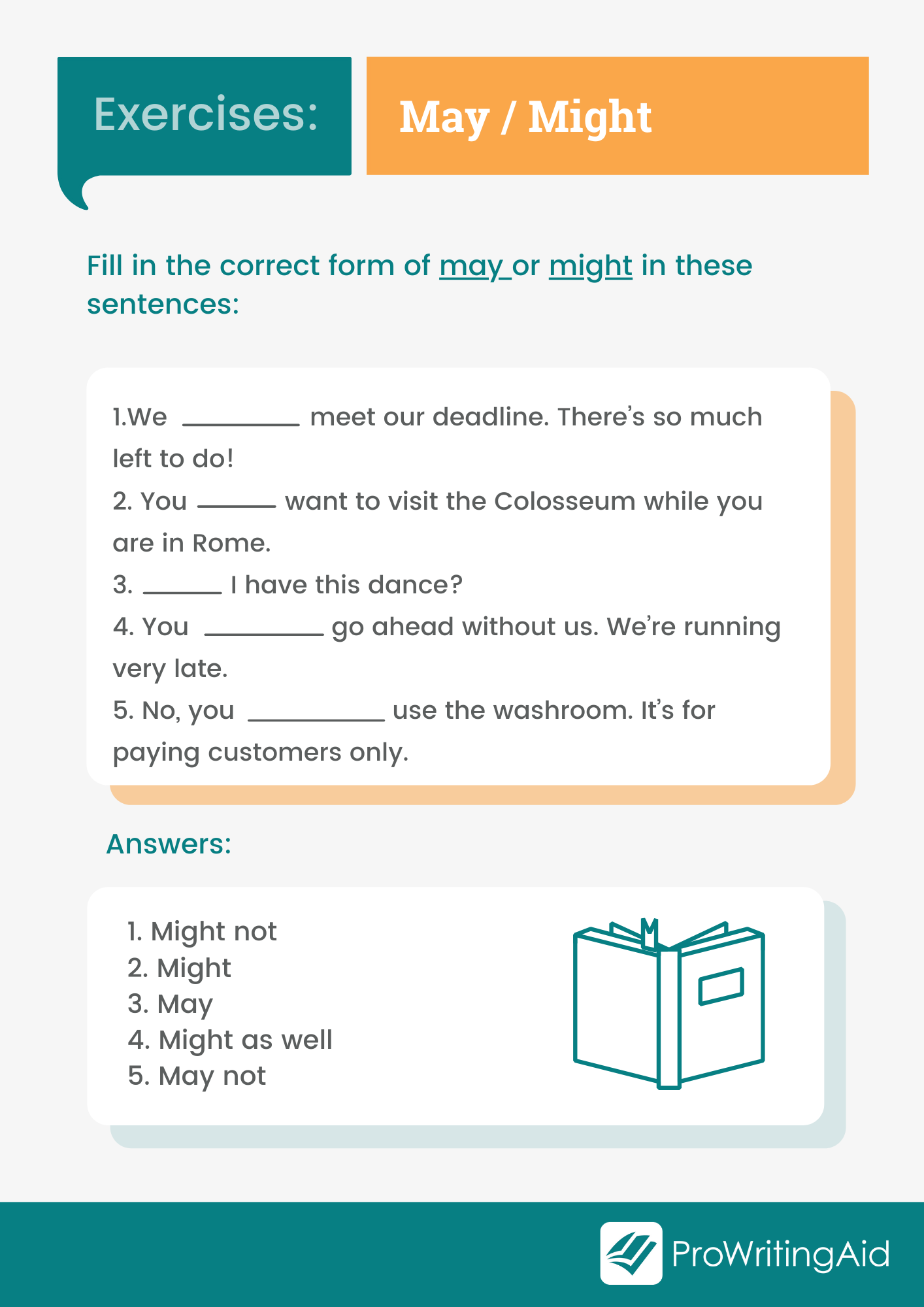
Download the review exercise for may and might here.
When and How Do I Use Shall, Should, and Ought To in a Sentence?
Shall and should have a range of subtle uses, from making polite suggestions to giving or asking for advice.
Grammar note: Be careful when choosing between the modal verb should and the word ought, because they have the same meaning but different grammar.
Ought is always followed by a to-infinitive:
You ought to know that by now.
They ought to have insisted on some compensation.
If you don’t have the time to learn the millions of grammar rules out there, or if you just want to double-check your work, ProWritingAid’s Realtime Report can help.
It will highlight grammatical issues such as dropping the 'to infinitive' to make sure that you can get your point across as clearly as possible.
Download our browser extension to see grammar suggestions wherever you write.
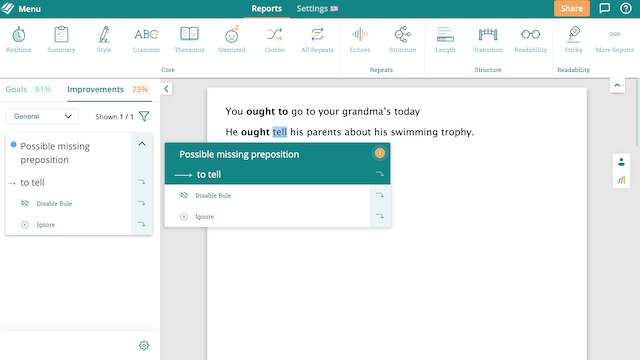
Something that is special to will and shall is that they can form the future tense. Shall is less popular now in American English, but it is still used in British English.
So the sentences “he will win the competition” and “he shall win the competition” are mostly equivalent, but shall is more formal in some contexts.
We’ll look at the rules for will soon. First, let’s see some examples of different ways to use shall, should, and ought to.
When Do I Use Shall in a Sentence?
Use shall to ask someone if they would like to do something, or if they would like you to do something, like this:
- Shall we dance?
- Shall we go for a walk?
- Shall I make us a cup of tea?
Note: Shall is only used with I or we. If you want to talk about a third person, you’ll need to use should or ought to.
Uncertainty
You can use should to ask what the right thing to do is in a situation. For example, if your taxi has arrived but you’re running late, you might ask a friend:
- Should I tell the driver to wait for us?
Here are some more examples:
- Should I stay home with him if he’s sick?
- What should Mariella do with the extra party food?
- Who should I ask about the application?
Predictions
If you’re pretty certain about something but you still have some doubts, you can say that it should happen:
- If we follow the instructions carefully, we should be able to build this bookcase properly.
In this example, you expect the instructions that come with your furniture to allow you to build it.
But as anyone who has tried to put together a flatpack bookcase knows, that isn’t always the case. Still, there should be a good end result.
- The recipe should be easy enough to follow.
- He shouldn’t be too hard to spot in a crowd. He’s very tall.
Advice
Here, we’re suggesting what the right thing is to do. Whether the person we’re talking to follows our advice or not is another matter:
- You should do your research before making a big investment.
- You ought to make a reservation soon.
- You shouldn’t say things like that. It’s not polite!
Exercise: Shall, Should, Ought To
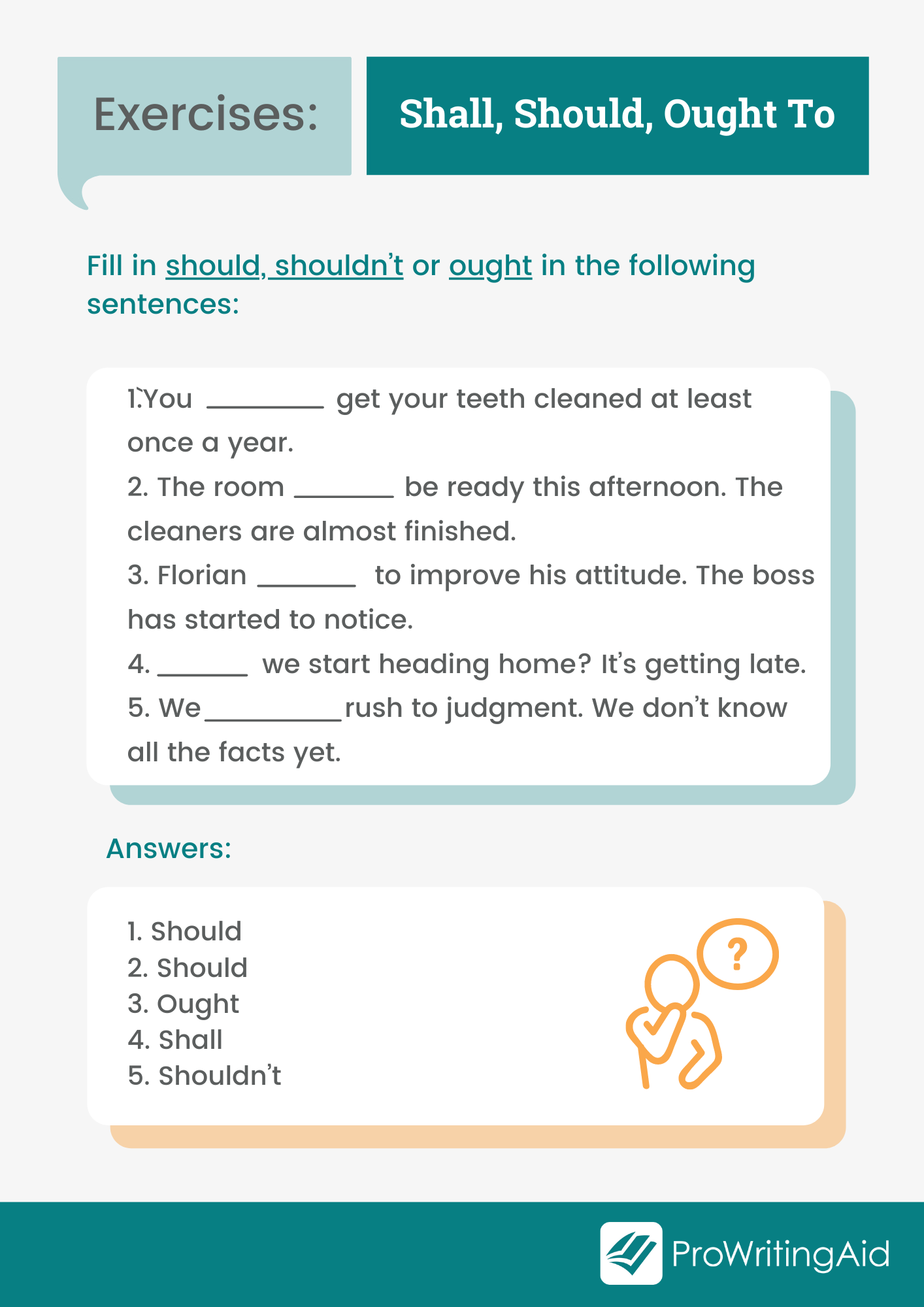
Download the review exercise for shall, should, and ought to here.
When and How Do I Use Must, Have To, and Need To?
We use the modal verb must to say if something is necessary or not, or persuade or forbid actions. Have to and need to work in the same way.
Necessity
Unlike should, with must, have to, and need to we are saying that the recommendation we’re giving isn’t optional.
- You must be this tall to ride the rollercoaster.
- Noel has to leave at 5pm.
- I need to take a closer look at the problem.
- My computer crashed. I had to redo all of my work!
- She needed to speak to him, but she couldn’t find him anywhere.
Note: Unlike have to and need to, must doesn’t work in the past tense.
You can also use have to and need to to say when something isn’t necessary:
- Modal verbs don’t have to be difficult. These simple rules can help!
- It doesn’t have to make sense to us. It’s not our business.
- Hans didn’t have to come back. He did it to save his friends.
- You needn’t bother. I’ll take care of it myself.
Prohibition
This is similar to the examples above, except when you’re forbidding something you’ll usually use must:
- They must not swim in the forbidden pool.
- You mustn’t judge us too harshly. We’re doing the best we can.
Note: Mustn’t = must not.
Certainty
We’ve all been completely tired out after travel before. If you met someone who had just got home from a road trip, you might say:
- You’ve been on the road all day. You must be exhausted.
Here, we use must to state something we think is true.
- You must have heard of her, she’s the most popular actress in the world!
- The dog is sick. He must have eaten too much grass.
Persuasion
In these cases, the thing you’re trying to persuade someone to do isn’t necessary—just something you really want to happen:
- You simply must try the coconut shrimp. It’s sublime!
- You have to visit us again before you leave town.
Review Exercise: Must, Have To, Need To
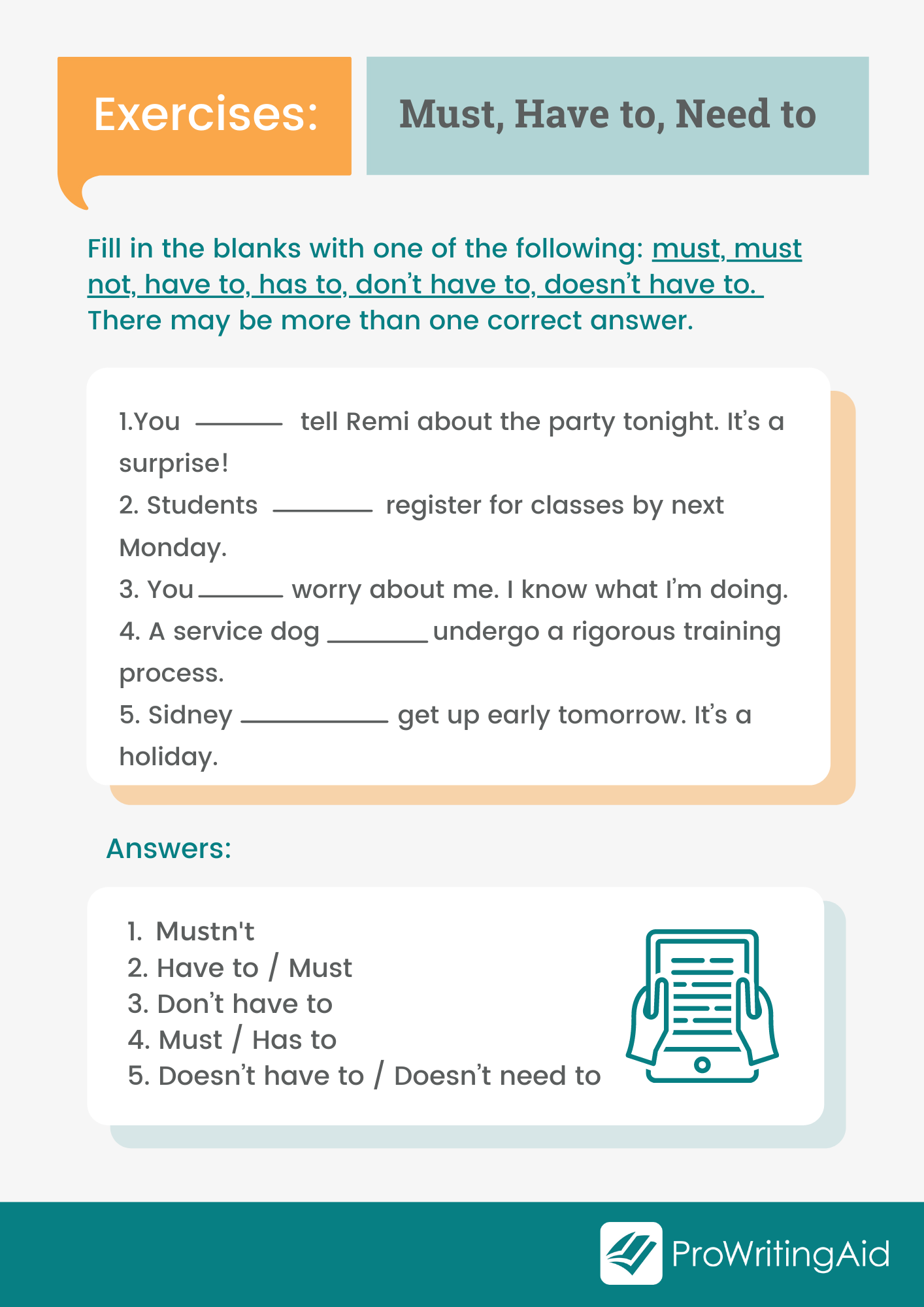
Download the review exercise for must, have to, and need to here.
When and How Do I Use Will and Would?
Will and would have various uses. Will can form the basic future tense, similar to shall. They are used in conditional if this happens, then that will happen statements.
Will and would can also make polite requests or statements, or talk about habits or things we usually do, or usually did in the past.
Predictions
If you want to say if something is or isn’t going to happen in the future, use will (or will not / won’t).
- We will go to the lake on Saturday.
- Only time will tell.
- The gymnast will not be happy with that score from the judges.
- I will teach you that next lesson.
Requests
In questions and statements with will and would, the asker is making sure that something is true or is not true.
In most cases, this is just a polite way of telling someone to do something, or saying that you are going to do something. For example:
- Would you lock the door if you’re the last to leave?
Here, the speaker is telling the person to lock the door if they are the last to leave. It would also be correct to say Can you lock the door if you’re the last to leave?. Using would suggests that the answerer has a choice, making it feel less direct or bossy.
- Next time, will you please ask me first before doing that?
- I would like to make a toast to the bride and groom.
You can also use would or will to check if things would be true in certain circumstances. You’ll normally see if in these sentences:
- Would you be angry if I took your last French fry?
In this sentence, the asker is asking if the specific action of taking the French fry would make someone angry. (If that someone was me, the answer would be Yes!)
Here are some more examples:
- If you go to the store, will you buy me some chips?
- Would you still go to the party if Poppy wasn’t going to be there?
Past Habits
If you want to say something happened in the past, you can just use the past tense:
- When I was younger, I stayed up all night one Christmas Eve.
But when you want to describe something that happened routinely or a habit you or someone else had in the past, use would.
- When I was younger, I would always stay up all night on Christmas Eve.
Here, we’re suggesting that this past behaviour happened every year—not just once. Here are some more examples:
- When he was a young warthog, he would spend hours looking for grubs to eat.
- Before starting my novel, I wouldn’t touch wine. Now, I drink a glass every day.
Review Exercise: Will, Would
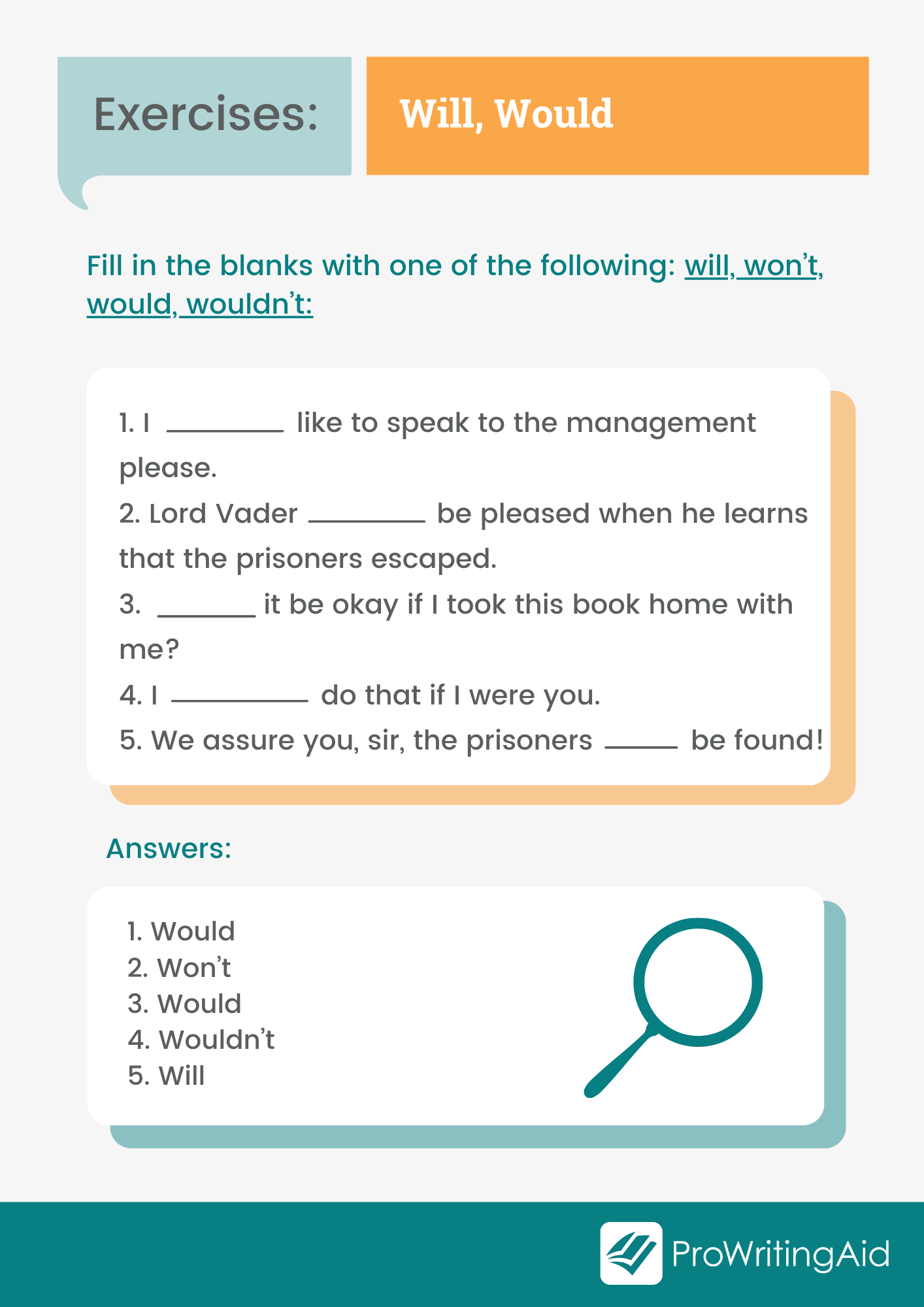
Download the review exercise for will and would here.
In Conclusion: The Many Modes of Modals
Whew! That’s a lot of modal verbs. One thing at least should be clear: these verbs are very powerful, and you should learn how to use them.
If you can complete the exercises, you’ll be well on your way toward mastering these tricky verbs.


